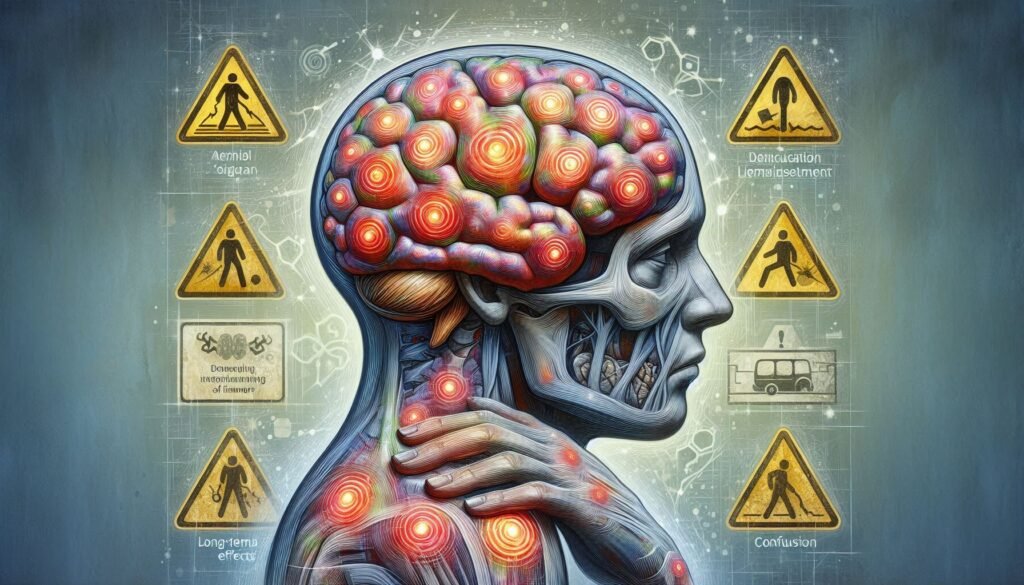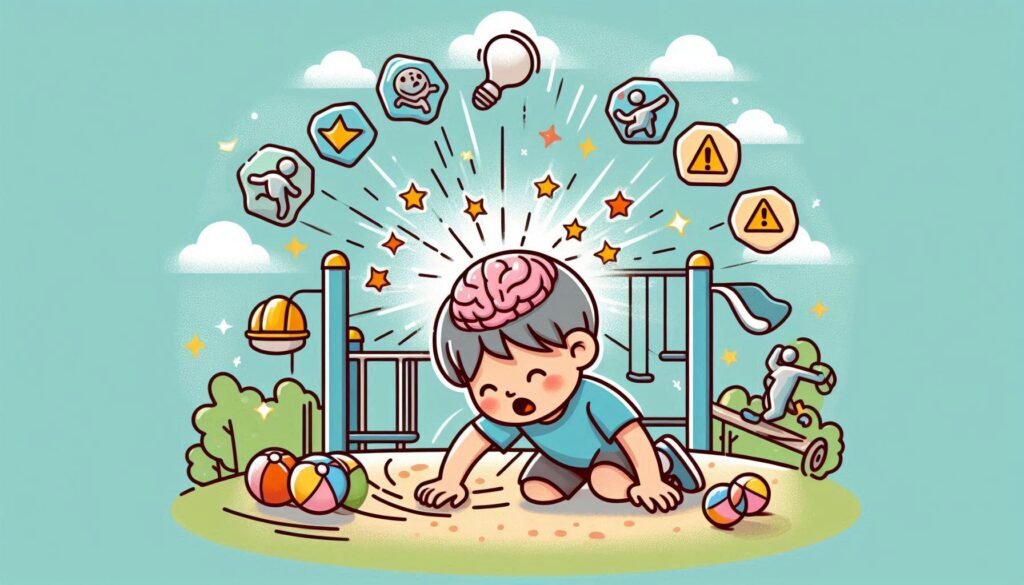Post-concussion disorder is a complex condition that can affect individuals long after an initial head injury. While many people associate concussions with immediate symptoms like headaches or dizziness, the reality is far more intricate. This disorder encompasses a range of ongoing issues that can hinder daily life and overall well-being.
Understanding post-concussion disorder requires looking beyond the surface. It’s about recognizing how these seemingly minor injuries can lead to significant cognitive, emotional, and physical challenges. Whether you’re someone who has experienced a concussion or know someone who has, this blog will delve into everything you need to know—from symptoms to management strategies—to navigate this often-misunderstood condition effectively.
Let’s embark on this journey together as we unravel the intricacies of post-concussion disorder and empower ourselves with knowledge!

Defining Post-Concussion Disorder: More Than Just a Headache
Post-concussion disorder refers to a set of symptoms that persist after the initial recovery from a concussion. Many individuals mistakenly believe that once the headache subsides, they are back to normal. However, this condition can cause lingering effects that last weeks or even months.
These symptoms extend beyond headaches and may include cognitive difficulties like problems with memory and concentration. Patients often report increased sensitivity to light and sound, as well as emotional challenges such as anxiety or depression.
Understanding post-concussion disorder requires recognizing its multifaceted nature. It’s not just about physical injuries; it also involves psychological and neurological components that complicate recovery.
This complexity makes it crucial for healthcare providers and patients alike to acknowledge post-concussion disorder in its entirety—ensuring appropriate management strategies are put in place for comprehensive care.
Common Symptoms of Post-Concussion Disorder
Post-concussion disorder can manifest in a range of symptoms that extend beyond the initial headache. Many individuals report persistent cognitive difficulties, including issues with memory, concentration, and decision-making. These challenges often interfere with day-to-day activities and may lead to frustration.
Physical symptoms are also common. Patients frequently experience light sensitivity or noise intolerance, which can exacerbate discomfort. Some might notice dizziness or balance problems, making everyday tasks feel daunting.
Emotional responses play a significant role as well. Anxiety and depression are prevalent among those dealing with post-concussion disorder. Mood swings can add an extra layer of complexity to recovery.
Sleep disturbances often plague patients as well. Insomnia or excessive fatigue can further hinder healing efforts and overall quality of life. Recognizing these diverse symptoms is crucial for timely intervention and support.
Risk Factors for Developing Post-Concussion Disorder
Several factors can increase the risk of developing post-concussion disorder. Age plays a significant role; younger individuals tend to experience more severe symptoms and may take longer to recover. The brain’s ongoing development in children and adolescents might contribute to this vulnerability.
Previous concussions also heighten the likelihood of experiencing this disorder. A history of multiple head injuries can lead to cumulative effects, making recovery more challenging. It’s essential for those with past concussions to approach recovery cautiously.
Gender differences are notable as well, with women generally reporting higher rates of post-concussion symptoms compared to men. Hormonal influences and variations in brain structure could explain this disparity.
Pre-existing mental health conditions may exacerbate outcomes after a concussion. Individuals with anxiety or depression prior to injury often report heightened symptom severity, underscoring the importance of addressing all aspects of health when managing post-concussion disorders.
Diagnostic Criteria and Evaluation Methods
Diagnosing post-concussion disorder requires a thorough evaluation. Healthcare professionals often start with a detailed medical history, focusing on the specifics of the concussion and any prior head injuries. Understanding how symptoms arose following the incident is crucial. Patients are encouraged to share their experiences candidly.
Physical examinations play a vital role too. Neurological assessments help determine cognitive function, balance, and coordination. These tests can reveal deficits that may not be immediately apparent but contribute to ongoing challenges faced by individuals.
Standardized questionnaires might also be utilized to gauge symptom severity and impact on daily life. Tools such as the Rivermead Post-Concussion Symptoms Questionnaire provide valuable insight into patients’ conditions over time.
Imaging studies, like MRIs or CT scans, are generally reserved for cases where more serious brain injuries are suspected. While they can rule out structural issues, most diagnoses rely heavily on clinical evaluation rather than imaging alone in cases of post-concussion disorder.
The Neurophysiology Behind Post-Concussion Disorder
Post-concussion disorder (PCD) arises from complex neurophysiological changes that occur after a traumatic brain injury. When the brain sustains impact, it can lead to alterations in neurotransmitter levels and neuronal connections. This disruption affects cognitive functions, emotional regulation, and physical responses.
Neuroinflammation is another significant factor involved in PCD. The body’s immune response kicks in post-injury, leading to inflammation that can persist long after the initial trauma. This ongoing inflammatory process may contribute to symptoms such as headaches and fatigue.
Additionally, abnormalities in cerebral blood flow have been observed in individuals with PCD. These changes hinder oxygen delivery to essential areas of the brain, exacerbating issues like dizziness and concentration difficulties.
Understanding these neurophysiological mechanisms helps medical professionals tailor treatment approaches for those suffering from post-concussion disorder. By addressing both biochemical imbalances and functional impairments, a more comprehensive recovery plan can be developed for affected individuals.
Treatment Options: A Multidisciplinary Approach
Post-concussion disorder often requires a multifaceted treatment strategy. This approach recognizes that the condition impacts various aspects of health. Collaboration among healthcare professionals is crucial for effective management.
Physicians, neurologists, psychologists, and physical therapists can all play a role in addressing the symptoms. Each specialist provides unique insights into recovery strategies tailored to individual needs. Regular communication between team members ensures cohesive care.
Medications may be prescribed to alleviate headaches or manage mood changes. While pharmacological options exist, they should complement other therapeutic interventions rather than serve as standalone solutions.
Therapies such as cognitive rehabilitation can enhance mental clarity and focus. Additionally, physical therapy helps address balance issues and neck pain common in post-concussion disorder cases. By understanding the interconnected nature of symptoms, this comprehensive approach fosters better outcomes for patients navigating their recovery journey.
Cognitive Rehabilitation Techniques for Post-Concussion Disorder
Cognitive rehabilitation techniques are essential for individuals recovering from post-concussion disorder. These approaches focus on enhancing cognitive functions like attention, memory, and problem-solving skills that may have been compromised after a concussion.
One effective method is cognitive training exercises. These activities can include puzzles, memory games, and computer-based programs designed to stimulate brain function. Regular practice helps reinforce neural connections and improve mental agility over time.
Another technique involves compensatory strategies. Patients learn to use tools such as planners or apps to manage daily tasks efficiently. This aids in minimizing frustration associated with cognitive challenges while promoting independence.
Working with a speech-language pathologist can also be beneficial. They can provide personalized interventions tailored to individual needs, focusing on communication difficulties that often arise after concussions. The combination of these methods fosters recovery and supports patients in regaining their confidence in everyday life activities.
Emotional and Psychological Support for Patients
Post-concussion disorder can significantly impact a patient’s emotional and psychological well-being. Individuals often experience anxiety, depression, or mood swings following their injury. These emotional responses are natural but require proper attention to ensure recovery.
Therapists specializing in cognitive behavioral therapy (CBT) can help patients process their feelings and develop coping strategies. This therapeutic approach allows individuals to address negative thought patterns that may arise from the disorder.
Support groups also play a crucial role in emotional healing. Connecting with others who share similar experiences fosters understanding and validation, reducing feelings of isolation. Sharing personal stories can be incredibly therapeutic.
Family support is essential during recovery. Educating loved ones about post-concussion disorder encourages empathy and patience while providing a safe space for open communication about struggles and progress.
Lifestyle Modifications to Manage Symptoms
Managing post-concussion disorder often requires lifestyle modifications that can significantly improve symptoms. One effective strategy is to establish a consistent daily routine. Regular sleep patterns help regulate the body’s internal clock, promoting better rest and recovery.
Diet also plays a crucial role in symptom management. A balanced diet rich in omega-3 fatty acids, antioxidants, and hydration can support brain health. Avoiding processed foods and excessive sugar may reduce inflammation and enhance cognitive function.
Mindfulness practices such as yoga or meditation can aid in calming the mind and reducing anxiety, which is common among those with post-concussion disorder. Incorporating gentle physical exercise helps boost mood while improving overall well-being without overwhelming the body.
Limiting screen time is equally essential for individuals experiencing visual disturbances or headaches after a concussion. Taking regular breaks from screens allows for better focus on recovery while minimizing triggers that could exacerbate symptoms.
Long-Term Outlook and Coping Strategies for Post-Concussion Disorder
The long-term outlook for individuals with post-concussion disorder varies significantly from person to person. While many recover fully within weeks or months, some may experience lingering symptoms that can affect their daily lives. It’s essential to recognize that recovery is not linear; fluctuations in symptoms are common.
Coping strategies play a vital role in managing this condition effectively. Establishing a routine can help create stability and predictability for those affected by post-concussion disorder. Incorporating regular physical activity, as tolerated, promotes both physical and mental well-being.
Mindfulness practices such as meditation or yoga can also provide relief from anxiety and stress associated with cognitive challenges. Support groups offer emotional understanding and shared experiences which foster resilience among peers facing similar issues.
It’s crucial to maintain open communication with healthcare providers about ongoing symptoms. They can adjust treatment plans accordingly, ensuring that the approach remains holistic and personalized. Keeping track of triggers—such as certain activities or environments—can assist patients in navigating their day-to-day life more comfortably.
While living with post-concussion disorder presents challenges, proactive management through lifestyle changes and support networks fosters hope for improved quality of life over time.


